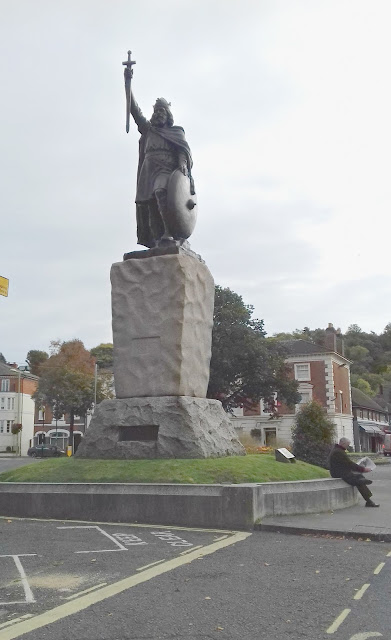Shadow of the Raven
(Sons of Kings Book 1)
By Millie Thom
Publisher: Independently Published
Page Length: 439 Pages
Genre: Historical Fiction
By the mid ninth century, Danish raids on Anglo-Saxon kingdoms have escalated. Several bands even dare to overwinter on the coastal islands, particularly those at the mouth of the Thames, where the kingdoms of Wessex and Mercia border each other. The kings of these lands must put past hostilities aside and take the first steps towards unity; steps they see as vital in the face of this newfound threat to their lands.
Alfred of Wessex and Eadwulf of Mercia are the sons of kings, whose futures have been determined since birth. But the turbulent events in their childhood years change the natural progression of things and shape the characters of the men they will become. Their roads to manhood follow vastly different routes, but both learn crucial lessons along the way: lessons that will serve them well in future years.
Discovering that the enemy is not always a stranger is a harsh lesson indeed; the realisation that a trusted kinsman can turn traitor is the harshest lesson of all.
Alfred of Wessex and Eadwulf of Mercia are the sons of kings, whose futures have been determined since birth. But the turbulent events in their childhood years change the natural progression of things and shape the characters of the men they will become. Their roads to manhood follow vastly different routes, but both learn crucial lessons along the way: lessons that will serve them well in future years.
Discovering that the enemy is not always a stranger is a harsh lesson indeed; the realisation that a trusted kinsman can turn traitor is the harshest lesson of all.
What made Alfred the Great so great?
By Millie Thom
Many thanks, Mary Anne, for giving me the opportunity to talk about one of the two main characters in my Sons of Kings series. I’m delighted to be here, adding my ‘two pence worth’ about King Alfred, who has become almost a household name in recent years, mainly thanks to the two great TV series. I seem to have had this character in my head for so many years it will be strange when I need to focus on someone else.
 |
Statue of King Alfred in Wantage Market Place. |
I first became interested in Alfred’s story when I lived and taught in Wantage, his place of birth, for six years in the 1970s. The story of his long fight against the invading Danes had intrigued me even before I moved to the town, and in Wantage I learnt so much more about him. Unfortunately, it was to be many more years before I could actually set to and write about this ‘Great’ king.
Over the past three thousand years there have been fewer than twenty individuals upon whom the title of ‘the Great’ has been conferred. In Ancient Greece we have Cyrus and Alexander, and at the beginning of Christian times, Pompey and Hero, then Constantine almost three centuries later. In the Western Empire we see the Frankish king and Holy Roman Emperor, Charlemagne (Charles the Great), and the German Otto 1 becoming known as ‘the Great’.
I won’t continue with the rest, but will say that the title seems to have been handed out in a random kind of way and that some characters who may seem deserving of the title have been overlooked. Examples of this can be seen in the cases of both Julius Caesar and Augustus whose achievements were very notable. Why is it, then, that Pompey – arguably far less historically important – holds the title of ‘the Great’, whilst they do not? Napoleon too, despite the efforts of patriotic French historians, was never awarded this title.
Among the many monarchs in Britain over the centuries, we find two kings who became ‘Great’. One is King Cnut (or Canute) the king of Denmark, Norway and England in the 10th century, generally best known for supposedly holding back the waves. Although he is often described as the ‘most effective king in Anglo-Saxon history’ Cnut was Danish, not British or Anglo-Saxon, so is often overlooked as a ‘great’ British king by historians.
But the other of the two British kings to have been called ‘the Great’, Alfred, King of Wessex, was undoubtedly a Saxon – although the title wasn’t bestowed upon him until post medieval times.
Compared to other ‘greats’ like Constantine and Charlemagne, whose exploits covered huge areas and involved enormous decisions, Alfred’s story is significant only when we consider the poverty of his resources and lack of means, as well as his own personal battle against a lifelong, debilitating illness, which many historians believe to have been Crohn’s disease. In the face of such adversity, his story is one of triumph of character – and for that, he will never be forgotten. Alfred saved his kingdom, Wessex (then all the land south of the River Thames), and left his son, Edward, to bring Mercia (the Midlands) under his control. Alfred’s grandson, Aethelstan, despite constant challenges, further extended control as far as the Scottish borders.
 |
Information at the base of Alfred’s statue in Winchester. |
Alfred’s military accomplishments are the things most people know about. Starting with his defeat of the Danes at Ashdown in 871, while he was still only his brother, King Aethelred’s, second in command, his long struggle against overwhelming numbers of Norse invaders is one that has been loved by story-tellers down the centuries. His desperate withdrawal to the Somerset marshes in 877 continues to enthral and spark the imagination. It was during that time, when he was at his lowest ebb and all seemed lost, that the fictional/mythical tale of him burning the woman’s cakes/loaves of bread supposedly took place.
The story has been compared to that of Robert the Bruce encountering the spider in the Scottish cave. These stories illustrate how both men were inspired enough by the event to become more positive and begin to make plans to reach their goals – to fight back at the enemy and take back their lands. The stories are turning points.
 |
The Alfred Jewel, discovered in 1693 in North Pemberton, Somerset. It is owned by the Ashmolean Museum in Oxford. The inscription on the back says ‘Alfred had me made’ |
Alfred never looked back or felt at a loss from then on. He went on to raise another army and win a decisive victory at the Battle of Edington in early May 878. Although this was by no means the end of Alfred’s battles with the Danes, it was the start of his great leadership and from then on we see him putting into practice defensive measures across his kingdom and leading with wisdom and forethought.
Alfred’s ‘greatness’, is not due to his political achievements alone. The title is also a tribute to his character and far-reaching views regarding building construction, learning and military and naval advancements.
As an administrator, Alfred advocated justice and order and established a code of laws and a reformed coinage. He had a strong belief in the importance of education and learnt Latin in his late thirties. He then arranged, and himself took part in, the translation of books from Latin to Anglo-Saxon.
The first tentative step towards the unification of the Anglo-Saxon kingdoms was (arguably) made by Alfred’s father, King Aethelwulf, when he made a treaty with King Beorhtwulf of Mercia. Alfred took things further, firstly by marrying a Mercian woman and later, marrying his eldest daughter, Aethelflaed, to a prominent Mercian ealdorman. In doing this – and the fact that his son-in-law never took the title of King of Mercia – Alfred, and his son after him, could happily take on that role. From then on, unions with the individual kingdoms continued until Alfred’s grandson, Aethelstan, became known as ‘The first king of the ‘English’ or ‘Anglish’– a name derived mostly from the name of the Angles (as in Anglo-Saxons). And England was Angleland.
Many stories about Alfred refer to him as ‘the wise king’, ‘England’s darling’ or ‘Truthteller’. But one chronicler in the Abingdon Chronicle evidently didn’t like Alfred one bit and called him ‘a Judas … piling bad deeds on top of each other.’ The reason he gives is that Alfred ‘violently alienated estates from the monastery’. In the 11th century, William of Malmesbury continues this by saying that Alfred ‘took their (i.e. the monasteries’) land and revenues for his own use.
It is true that Alfred became very unpopular with many of the monastic orders. At times during his fight to keep Wessex from the Danes, it had been necessary to ‘pay them off’. In other words, he needed huge sums of money to pay the Danes ‘tribute’, or Danegeld, in exchange for them leaving Wessex alone and moving elsewhere to raid – which worked, at least, for a time. To find enough money to do this he was forced to turn to both the Wessex nobility and the Church.
I think in this case, perhaps the monks should have been told ‘You can’t have your cake and eat it…’ If Alfred hadn’t taken their money, the Danes would have done! It wouldn’t surprise me to discover that Alfred did, indeed, say something very similar – in his politest Anglo-Saxon, of course.
Alfred the Great silver offering penny, 871-899. ‘Aelfred Rex Saxonum’ (Alfred, King of the Saxons).
In my series, Alfred’s story is told alongside that of a second protagonist, Eadwulf, the fictional son of King Beorhtwulf of Mercia. But Eadwulf’s life takes a completely different route, as told in Book One, Shadow of the Raven:
Two kingdoms threatened; two sons of kings learning to survive…
This series is free to read with #KindleUnlimited subscription.
Millie Thom is a former geography and history teacher with a particular passion for the Anglo-Saxon and Viking period. Originally from Lancashire, she is a mother of six grown up children and now lives with her husband in a small village in Nottinghamshire, midway between the town of Newark and the lovely old city of Lincoln. When not writing, Millie enjoys long walks and is a serious fossil hunter. She is also an avid traveller, swimmer and baker of cakes!














No comments:
Post a Comment
See you on your next coffee break!
Take Care,
Mary Anne xxx